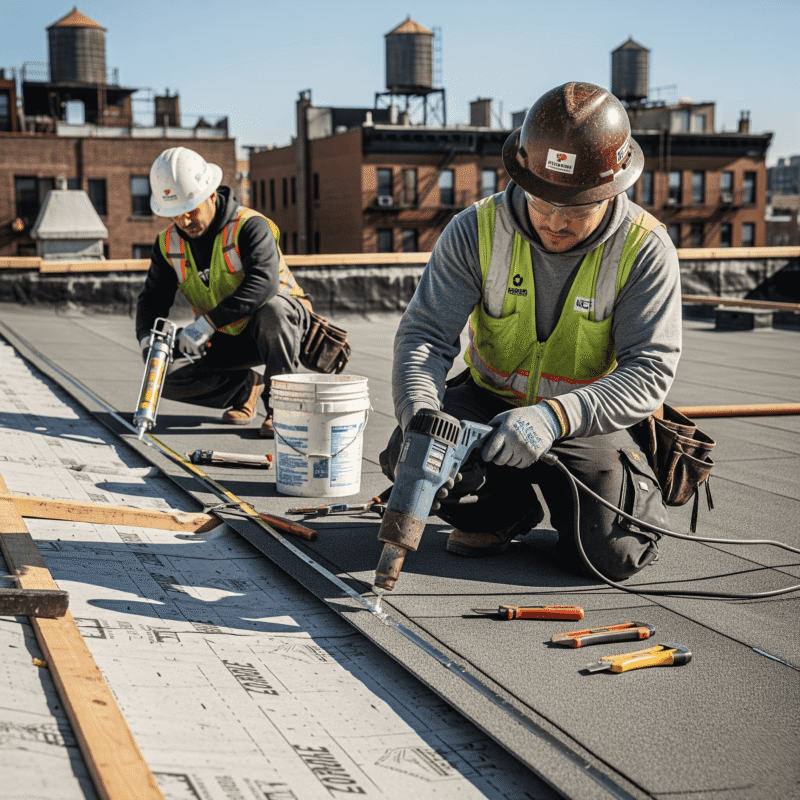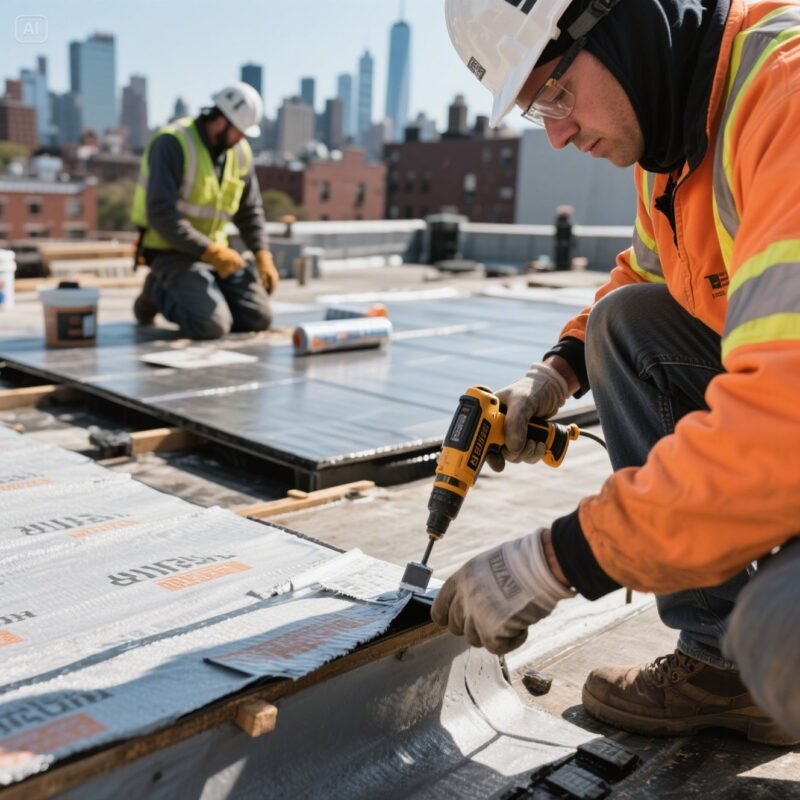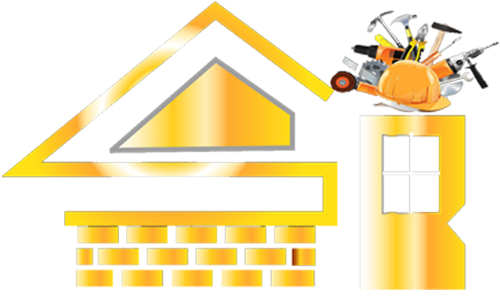What makes flat roofing options a popular choice for commercial buildings in Brooklyn? Choosing the right roofing option for your business is crucial to ensure durability, cost-effectiveness, and optimal energy efficiency. In this guide, we will explore everything you need to know about commercial flat roofing systems in Brooklyn, NYC. From types of roofing materials to the installation process, costs, and expert tips, you can explore everything in this delta guide!
Types of Commercial Flat Roofing Systems
A flat roofing system is a popular option for many commercial buildings, especially in urban areas like Brooklyn. Unlike sloped roofs, flat roofs have a horizontal or slightly pitched design. They provide usable space for HVAC systems, solar panels, or even rooftop gardens. The main reason flat roofs are preferred for commercial buildings is their affordability and practicality. They allow for easy installation, maintenance, and repairs.
In this section, we will explore the most common types of commercial flat roofing systems. Each type has its own benefits and limitations, so it’s important to understand them fully before deciding for your building.
1. EPDM (Ethylene Propylene Diene Monomer)
- Types: Single-ply rubber membrane
- Lifespan: 20 to 35 years
- Cost: $4 to $8 per square foot
Advantages
- Excellent weather resistance
- Easy to install and repair
- Affordable option for flat roofs
Disadvantages
- Can discolor over time
- Not as energy-efficient as other systems
2. TPO (Thermoplastic Polyolefin)
- Types: Single-ply membrane
- Lifespan: 15 to 25 years
- Cost: $5 to $8 per square foot
Advantages
- Highly reflective, energy-efficient
- Resistant to UV rays and chemical damage
- Flexible and easy to install
Disadvantages
- Quality can vary based on the manufacturer
- Seams may require frequent maintenance
3. PVC (Polyvinyl Chloride)
- Types: Single-ply thermoplastic membrane
- Lifespan: 20 to 30 years
- Cost: $7 to $12 per square foot
Advantages
- Durable and resistant to chemicals
- UV-resistant, highly reflective
- Long-lasting with minimal maintenance
Disadvantages
- Higher initial installation cost
- Requires skilled labor for installation
4. Modified Bitumen
- Types: Asphalt-based with polymer-modified materials
- Lifespan: 15 to 20 years
- Cost: $4 to $7 per square foot
Advantages
- Good flexibility in colder climates
- UV and weather resistant
- Simple to install with fewer seams
Disadvantages
- Prone to punctures
- Installation can be messy and labor-intensive
5. Built-Up Roofing (BUR)
- Types: Multiple layers of Bitumen and fabric
- Lifespan: 20 to 30 years
- Cost: $5 to $9 per square foot
Advantages
- Very durable and waterproof
- Excellent for flat roofs with heavy traffic
- Provides a thick barrier against the elements
Disadvantages
- Heavy and difficult to install
- May require regular maintenance
6. Spray Polyurethane Foam (SPF)
- Types: Spray-applied foam that hardens into a solid surface
- Lifespan: 15 to 20 years
- Cost: $3 to $6 per square foot
Advantages
- Seamless application with no gaps
- Provides excellent insulation
- Lightweight and easy to maintain
Disadvantages
- Can be damaged by UV exposure without proper coating
- Requires skilled application for optimal results
7. Green Roofing
- Types: A roof covered with plants and vegetation
- Lifespan: 30 to 50 years
- Cost: $15 to $25 per square foot
Advantages
- Provides natural insulation and energy savings
- Improves air quality and reduces urban heat
- Can be used to manage storm-water
Disadvantages
- Requires regular maintenance and care
- High upfront cost
- May require additional structural support
8. Ballasted Roofing
- Types: A single-ply membrane held down with gravel or stones
- Lifespan: 20 to 30 years
- Cost: $5 to $10 per square foot
Advantages
- Easy to install and maintain
- No adhesives or heat required
- Ballast protects the roof membrane from damage
Disadvantages
- Heavy and may need additional structural support
- High winds can displace gravel

Which is the Suitable Commercial Flat Roofing Type for Brooklyn’s Weather
Brooklyn’s weather presents unique challenges for commercial flat roofing. The climate includes cold winters, hot summers, and frequent storms. When choosing a roofing system for these conditions, it’s important to consider durability, insulation, and the ability to prevent both extreme heat and cold.
EPDM (Ethylene Propylene Diene Monomer) is often the best choice for Brooklyn’s weather. This material offers excellent protection against UV rays and ozone, making it perfect for the city’s hot summers. It’s also durable enough to handle the cold winters and occasional snow. EPDM’s flexibility allows it to expand and contract with temperature changes, which helps avoid damage in extreme conditions.
TPO (Thermoplastic Polyolefin) is another good option. It reflects sunlight, keeping buildings cooler in the summer and reducing energy costs. TPO is also resistant to heat. This feature makes it suitable for the warmer months. While it may not last as long as EPDM, it offers good performance in Brooklyn’s diverse climate.
Lastly, PVC (Polyvinyl Chloride) is a strong and resilient material resistant to harsh weather conditions. Its ability to reflect UV rays and resist water damage makes it a solid choice for Brooklyn’s rainy periods. Though PVC comes with a higher price tag, its durability in extreme conditions justifies the investment.
Commercial Flat Roof Installation Process: Expert Suggestions
A commercial flat roof installation requires careful planning and professional execution. Here’s the step-by-step process to ensure your roof lasts for many years:
- Step 1: Select the Right Roofing Material: Begin by choosing the most suitable material for your building. Consider factors like climate, cost, and energy efficiency. Different materials, such as EPDM, TPO, or PVC, may suit different needs.
- Step 2: Prepare the Roof Deck: Clean and inspect the existing roof structure. Any debris, old roofing, or damaged materials must be removed. A proper roof deck ensures a strong base for the new roofing system.
- Step 3: Apply Insulation: Insulation helps to control temperature and reduce energy costs. The type of insulation used can require installing foam boards or fiberglass between the roof deck and the new membrane.
- Step 4: Install the Roofing Membrane: Lay the roofing material (EPDM, TPO, PVC, etc.) on top of the insulation. For some materials, this may involve rolling them out, while others may require welding or gluing in place. Ensure proper overlap at seams to prevent leaks.
- Step 5: Seal the Seams: Seams play an important role in a flat roof’s waterproofing. Ensure that each seam is sealed properly using the correct welding methods. A well-sealed seam helps keep the roof leak-free.
- Step 6: Add Flashing Around Edges: Flashing is placed along the roof edges, around vents, and other protrusions. It helps prevent water from getting under the roofing material and reduces the risk of leaks.
- Step 7: Final Inspection: After installation, perform a detailed inspection. Check for any damage, improperly sealed seams, and ensure the roof is level, with the drainage system functioning properly.
How Much Does A Commercial Flat Roof Replacement Cost (Per Square Foot) in Brooklyn, NYC
A commercial flat roof replacement is a vital investment for your property. These costs can vary depending on the type of roofing material, the roof’s size, and the complexity of the installation.
| Roof Type | Material Cost | Labour Cost | Total Cost |
| EPDM | $4 – $8 per sq ft | $3 – $5 per sq ft | $7 – $13 per sq ft |
| TPO | $5 – $8 per sq ft | $3 – $5 per sq ft | $8 – $13 per sq ft |
| PVC | $7 – $12 per sq ft | $4 – $6 per sq f | $11 – $18 per sq ft |
| Modified Bitumen | $4 – $7 per sq ft | $3 – $5 per sq ft | $7 – $12 per sq ft |
| BUR (Built-Up Roofing) | $5 – $9 per sq ft | $3 – $5 per sq ft | $8 – $14 per sq ft |
| Spray Polyurethane Foam (SPF) | $3 – $6 per sq ft | $2 – $4 per sq ft | $5 – $10 per sq ft |
| Green Roofing | $15 – $25 per sq ft | $5 – $10 per sq ft | $20 – $35 per sq ft |
Why Do Commercial Buildings Have Flat Roofs?
Flat roofs are a popular choice for commercial buildings, especially in cities like Brooklyn. They offer many practical benefits which make them suitable for a wide range of businesses.
One of the main reasons flat roofs are used is their cost-effectiveness. A flat roof is often cheaper than sloped roofs, especially in terms of materials and labor. Additionally, flat roofs are easy to maintain and repair. It reduces long-term costs.
Flat roofs also provide valuable space for HVAC units, solar panels, and even green roofs. This extra space allows businesses to optimize their buildings for better energy efficiency or sustainability.
What are the Benefits of Commercial Flat Roofing
- Cost-Effective: Flat roofs are typically less expensive to install and maintain than sloped roofs. This makes them an attractive option for businesses with tight budgets. The simple design reduces material costs and the installation process is faster.
- Maximized Usable Space: Flat roofs provide more usable space for equipment, storage, or even a rooftop garden. You can place air conditioning units, solar panels, or other equipment on the roof without taking up valuable space inside the building.
- Easy Access for Maintenance: Flat roofs are easier to access for repairs and inspections.
Maintenance is quicker and less expensive compared to sloped roofs, where work is more difficult and dangerous. - Energy Efficiency: Flat roofs can be easily outfitted with insulation or reflective materials.
This helps regulate the temperature inside the building and can lower energy costs in both winter and summer.

Where to Find Best commercial flat roofing contractors
Are you looking for an expert roofing contractor in Brooklyn, NYC? SR General Construction has you covered! Our business is located at 8807 Avenue B, Brooklyn, NY 11236, United States, in the Canarsie area.
We proudly serve all areas of Brooklyn with high-quality, durable roofing solutions. From new installations to repairs and maintenance, we provide the best service at affordable prices. Contact us and experience why we’re Brooklyn’s roofing experts!
FAQ
1. What is the most popular type of commercial flat roof in Brooklyn?
EPDM (Ethylene Propylene Diene Monomer) is the most popular choice for commercial flat roofs in Brooklyn. This rubber-based roofing material is durable, cost-effective, and can withstand both the hot summers and cold winters that Brooklyn experiences. It also requires minimal maintenance and offers excellent resistance to UV rays.
2. How long do commercial flat roofs last?
The lifespan of a commercial flat roof varies depending on the material used. EPDM and TPO last between 15 to 35 years, while PVC and Built-Up Roofing (BUR) can last 20 to 30 years with proper maintenance. Proper installation and regular upkeep can help extend the lifespan of any flat roof.
3. What is the best roofing material for Brooklyn’s weather?
EPDM is the best roofing material for Brooklyn’s weather due to its strong resistance to UV rays, ozone, and extreme temperature fluctuations. TPO and PVC are also good options, as they reflect sunlight, helping to keep buildings cooler during the hot summer months, while remaining durable during winter.
4. How much does it cost to replace a commercial flat roof in Brooklyn?
The cost of replacing a commercial flat roof in Brooklyn varies by material and size. On average, the cost ranges from $7 to $18 per square foot. EPDM and TPO are more affordable, while PVC and Green Roofing can cost more upfront. The final price also depends on labor costs and roof complexity.
5. Why are flat roofs so common for commercial buildings?
Flat roofs are popular for commercial buildings due to their low installation cost and easy maintenance. They provide extra space for HVAC systems, solar panels, or even rooftop gardens.
6. What are the advantages of a Green Roof for a commercial building?
A Green Roof offers significant environmental benefits, such as reducing urban heat and improving air quality. It also provides natural insulation, which helps reduce energy costs.
7. What is the most affordable commercial flat roofing option for a low budget?
EPDM (Ethylene Propylene Diene Monomer) is the most affordable commercial flat roofing option. It provides excellent durability at a relatively low installation cost.
